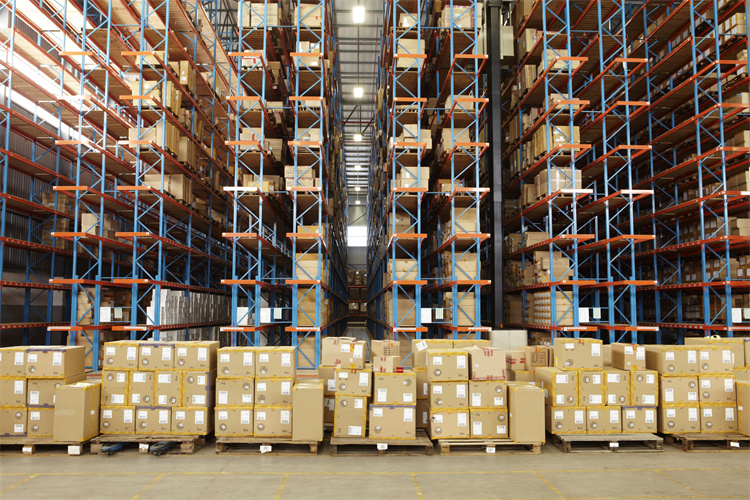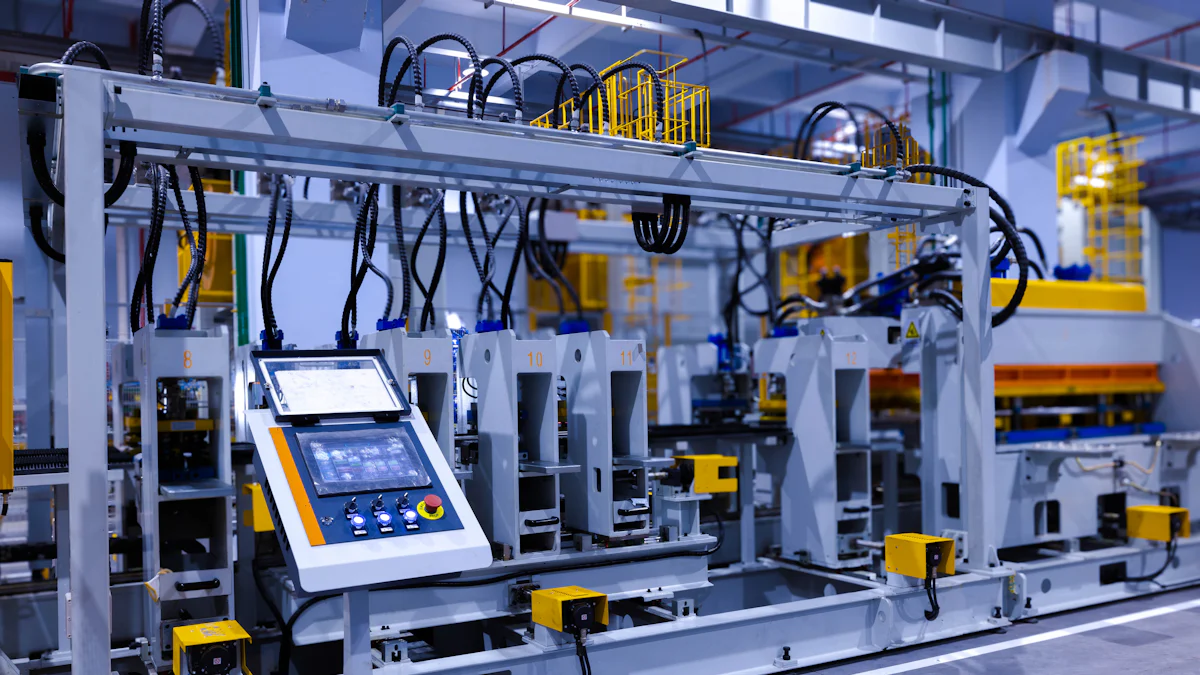Technology Trends Transforming Warehouse Management

In today's fast-paced world, technology plays a crucial role in modern warehouse management. You see its impact everywhere, from automated systems to real-time inventory tracking. The rapid pace of technological advancements reshapes how warehouses operate. For instance, automation in warehouses is expected to grow significantly, with over 75% of warehouses anticipated to adopt it by 2023. Businesses increasingly recognize the benefits of these solutions, with 60% planning to invest in conveyor and sortation systems soon. These changes not only enhance efficiency but also transform the entire industry landscape.
Emerging Technology Trends in Warehouse Management
Automation and Robotics
Role of Automated Guided Vehicles (AGVs)
Automated Guided Vehicles (AGVs) transform how you manage warehouse operations. These vehicles navigate through warehouses, transporting goods with precision. By reducing manual labor, AGVs enhance efficiency and safety. You can rely on them for consistent performance, minimizing human error and increasing productivity.
Impact of Robotics on Labor Efficiency
Robotics revolutionizes labor efficiency in warehouses. Robots handle repetitive tasks, allowing your workforce to focus on more complex activities. This shift not only boosts productivity but also reduces operational costs. As a result, you achieve faster processing times and improved accuracy in order fulfillment.
Internet of Things (IoT)
Real-time Inventory Tracking
The Internet of Things (IoT) offers real-time inventory tracking, providing you with up-to-date information on stock levels. This technology minimizes discrepancies and prevents stockouts. With IoT, you gain better control over inventory, ensuring that you meet customer demands promptly.
Enhanced Connectivity and Communication
IoT enhances connectivity and communication within your warehouse. Devices communicate seamlessly, sharing data across platforms. This connectivity streamlines operations, enabling you to make informed decisions quickly. Improved communication leads to smoother workflows and increased operational efficiency.
Artificial Intelligence and Machine Learning
Predictive Analytics for Demand Forecasting
Artificial Intelligence (AI) and Machine Learning (ML) bring predictive analytics to demand forecasting. These technologies analyze data patterns, helping you anticipate future demand accurately. By understanding trends, you can optimize inventory levels and reduce waste, ensuring that you meet customer needs efficiently.
AI-driven Decision Making
AI-driven decision-making transforms warehouse management. AI systems process vast amounts of data, offering insights that guide your strategic choices. From optimizing routes to managing resources, AI empowers you to make decisions that enhance efficiency and reduce costs. This technology positions you to stay competitive in a rapidly evolving industry.
Specific Technologies Revolutionizing Warehouses

Warehouse Management Systems (WMS)
Warehouse Management Systems (WMS) play a pivotal role in modern warehouse management. These systems streamline operations by integrating with other systems, such as Enterprise Resource Planning (ERP) and Transportation Management Systems (TMS). This integration ensures seamless data flow across platforms, enhancing your ability to manage inventory efficiently. You can track goods from arrival to dispatch, reducing errors and improving accuracy.
Integration with Other Systems
Integration with other systems allows you to automate processes that were once manual. For example, when WMS connects with ERP, you gain real-time insights into inventory levels and order statuses. This connectivity helps you make informed decisions quickly, ensuring that your warehouse operations run smoothly. By integrating WMS with TMS, you optimize transportation routes, reducing delivery times and costs.
Benefits of Cloud-based WMS
Cloud-based WMS offers several advantages over traditional systems. You access data from anywhere, providing flexibility and scalability. This accessibility allows you to manage multiple warehouses from a single platform, streamlining operations. Cloud-based systems also reduce the need for on-site IT infrastructure, lowering costs and simplifying maintenance. With real-time updates, you stay informed about inventory changes, enhancing your warehouse management capabilities.
Drones in Inventory Management
Drones are transforming inventory management in warehouses. They offer speed and accuracy in stocktaking, allowing you to conduct inventory checks quickly and efficiently. Drones navigate through aisles, scanning barcodes and capturing data in real-time. This technology reduces the time spent on manual inventory counts, freeing up your workforce for other tasks.
Speed and Accuracy in Stocktaking
Drones enhance the speed and accuracy of stocktaking. They fly over shelves, capturing images and data with precision. This capability minimizes human error and ensures that your inventory records are up-to-date. By using drones, you reduce the time required for inventory audits, improving overall efficiency in warehouse management.
Challenges and Limitations
Despite their benefits, drones face challenges in warehouse environments. Indoor navigation can be complex, requiring advanced software to avoid obstacles. Additionally, integrating drone data with existing warehouse systems may pose difficulties. However, commercial drone software addresses these issues by offering solutions for fleet coordination and data integration. As technology advances, these challenges will likely diminish, making drones an even more valuable tool in warehouse management.
Blockchain technology is revolutionizing Supply Chain Transparency
Blockchain technology is revolutionizing supply chain transparency. It provides a secure and immutable ledger for recording transactions, ensuring data security and integrity. By using blockchain, you enhance trust and accountability in your supply chain operations.
Ensuring Data Security and Integrity
Blockchain ensures data security by encrypting information and storing it across a decentralized network. This structure prevents unauthorized access and tampering, safeguarding your warehouse management data. You can rely on blockchain to maintain accurate records, reducing the risk of fraud and errors.
Streamlining Transactions and Record Keeping
Blockchain streamlines transactions and record keeping by automating processes. Smart contracts execute automatically when predefined conditions are met, reducing the need for manual intervention. This automation speeds up transactions and improves efficiency in warehouse management. By adopting blockchain, you enhance transparency and accountability, positioning your warehouse operations for success in a competitive market.
JUSDA's Role in Transforming Warehouse Management
JusLink Intelligent Supply Chain
Integration of IoT and Cloud Computing
JUSDA's JusLink Intelligent Supply Chain stands at the forefront of warehouse management innovation. By integrating the Internet of Things (IoT) and cloud computing, you gain unprecedented control and visibility over your supply chain operations. IoT devices provide real-time data on inventory levels, equipment status, and environmental conditions. This data flows seamlessly into cloud-based platforms, allowing you to access it from anywhere. You can make informed decisions quickly, optimizing your warehouse operations for efficiency and accuracy.
Enhancing Supply Chain Visibility
With JUSDA's solutions, you enhance supply chain visibility significantly. The integration of advanced technologies like Radio-Frequency Identification (RFID) and Warehouse Management Systems (WMS) ensures that you track goods throughout their journey. This transparency helps you identify potential issues before they escalate, ensuring smooth operations. By leveraging these tools, you maintain optimal stock levels, reduce delays, and meet customer demands promptly. JUSDA's approach sets a benchmark in the logistics industry, demonstrating how technology can transform warehouse management.
Cloud Warehousing Solutions
Real-time Inventory Management
JUSDA's cloud warehousing solutions revolutionize how you manage inventory. Real-time tracking systems provide up-to-date information on stock levels, minimizing the risk of stockouts or overstocking. You can monitor inventory across multiple locations from a single platform, ensuring that products are available when needed. This capability enhances order accuracy and speeds up delivery times, directly impacting customer satisfaction. By automating routine tasks, you free up resources for more strategic activities, improving overall operational efficiency.
Benefits for Various Industries
JUSDA's cloud warehousing solutions offer significant benefits across various industries. Whether you're in electronic manufacturing, automotive, or fast-moving consumer goods (FMCG), these solutions adapt to your specific needs. You gain flexibility and scalability, allowing you to respond to changing market demands swiftly. The reduction in on-site IT infrastructure lowers costs and simplifies maintenance, making it easier for you to focus on core business activities. By adopting JUSDA's innovative strategies, you position your business for success in a competitive market.

JUSDA Solutions
To provide you with professional solutions and quotations.
Technology is transforming warehouse management, offering you tools to enhance efficiency and accuracy. By embracing automation, AI, and IoT, you can streamline operations and stay competitive. Continuous adaptation is crucial as new trends emerge. The future promises even more innovation, with data-driven insights and robotics leading the way. To thrive, you must leverage these advancements, ensuring your warehouse remains agile and efficient. As you navigate this evolving landscape, remember that embracing technology is not just an option—it's a necessity for success.
See Also
Automated Future: Benefits of High-Tech Warehouse Manufacturing
Essential Business: Warehouse Automation Importance
Logistics Robotics Power: Boosting Warehouse Efficiency
Explaining Robotic Automation: Boosting Warehouse Efficiency
